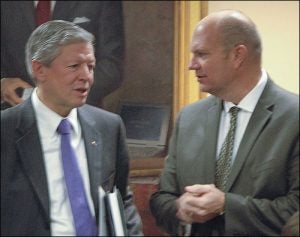PROPOSED FUNDING
Board of Governors moves to ease Brody’s budget squeeze
The Brody School of Medicine will get a budgetary shot in the arm if a recommendation adopted by the UNC Board of Governors is funded by the General Assembly.

ECU Chancellor Steve Ballard, left, speaks with Harry Smith, chair of the UNC Board of Governors Committee on Budget and Finance during the Dec. 5 meeting in Chapel Hill. (Photo by Steve Tuttle)
Brody would receive $8 million in “sustainability funds” earmarked in the UNC system’s proposed budget for next fiscal year. The appropriation would help cover losses Brody incurred as a result of changes in Medicare reimbursement rates and other financial shifts in the evolving health care industry. The UNC Chapel Hill School of Medicine would get $2 million to shore up its balance sheet.
“If we’re going to have financially stable medical schools and produce the health care professionals that are needed for North Carolina, then they need additional funding,” UNC President Tom Ross said after the board’s Dec. 5 meeting in Chapel Hill.
While drawing up an overall budget for the UNC system for the coming fiscal year, the board’s Committee on Budget and Finance became concerned about the financial health of the state’s two medical schools. It explored actual costs that East Carolina University and UNC Chapel Hill incur to train new doctors and provide a health care safety net for the state’s poorest citizens.
Committee Chair Harry Smith said his conclusion is that both state-supported medical schools are struggling but that Brody is in worse shape. Smith said his committee initially considered evenly dividing the $10 million between ECU and Chapel Hill. After looking closer at the numbers, he said the committee shifted the lion’s share to ECU.
Unlike Carolina, ECU does not own its teaching hospital. The Brody School of Medicine relies on state appropriations and revenue generated by its medical faculty practice plan, ECU Physicians.
UNC Chapel Hill has those two revenue streams plus income from UNC Health Care, one of the state’s largest health care systems. It earned a $114 million profit in fiscal 2013, according to its annual report.
ECU Physicians lost more than $10 million last fiscal year, mainly from indigent care and lower reimbursement rates, according to Rick Niswander, ECU vice chancellor for administration and finance.
The medical schools also lost revenue as a result of changes made by the General Assembly in 2013 to the Set Off Debt Collection Act and the reduction of Medicaid Upper Payment Limit reimbursements.
Brody has soldiered on “despite many cuts in funding over the years,” said Dean Paul Cunningham. “Even with sequential internal adjustments, and increased efficiencies, it is now clear that the school has arrived at a critical juncture. The recognition of this is evident in the strategies that are being developed by our leaders. We are grateful for the attention,” Cunningham said.
“Brody has to much more stand on its own legs, which primarily means standing on state resources because it can’t benefit from the generation of additional revenue that the UNC Health Care system produces for (the UNC) medical school,” Ross said.
During the board meeting, Bill Roper, dean of the UNC School of Medicine and CEO of UNC Health Care, rose from the audience to say he does not oppose ECU getting most of the proposed new funding. Both schools have unmet budget needs, but “they need it more than we do,” he said.
The board then unanimously accepted the committee’s recommendations.
Smith, the CEO of Flanders Corp. in Washington and an ECU graduate, told the board his committee believes the medical schools need state funding above what’s needed to keep the lights on.
“What does it take to run both medical schools without having to put them on an oxygen tank?” he said. He recommended that the board start “pushing back in the other direction” when talk turns to further cuts in UNC system funding.
The $10 million is in a very small pot of new money in the Board of Governors’ proposed budget for the fiscal year beginning July 1. The total operating and capital budget of $2.57 billion is an increase of about 1.9 percent from current levels. The board now will forward its budget to Gov. Pat McCrory, who will include it in the state budget he will propose to the General Assembly when reconvenes in January.
As directed by the Office of State Budget and Management, the Board of Governors spending proposal assumes a 2 percent net reduction in total state appropriations to the UNC system. ECU’s proportional share of that cut is about $5.5 million.
However, the Board of Governors budget includes $47.5 million in revenues resulting from a projected 2 percent growth in enrollment. If the campuses are allowed to keep enrollment growth money next fiscal year, as the governor’s office has indicated, ECU would gain about $2.5 million.